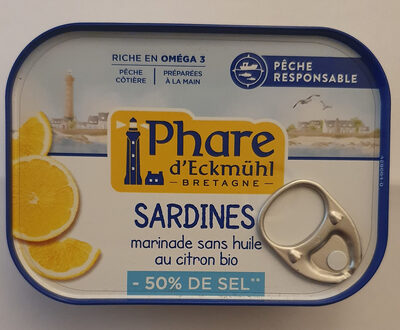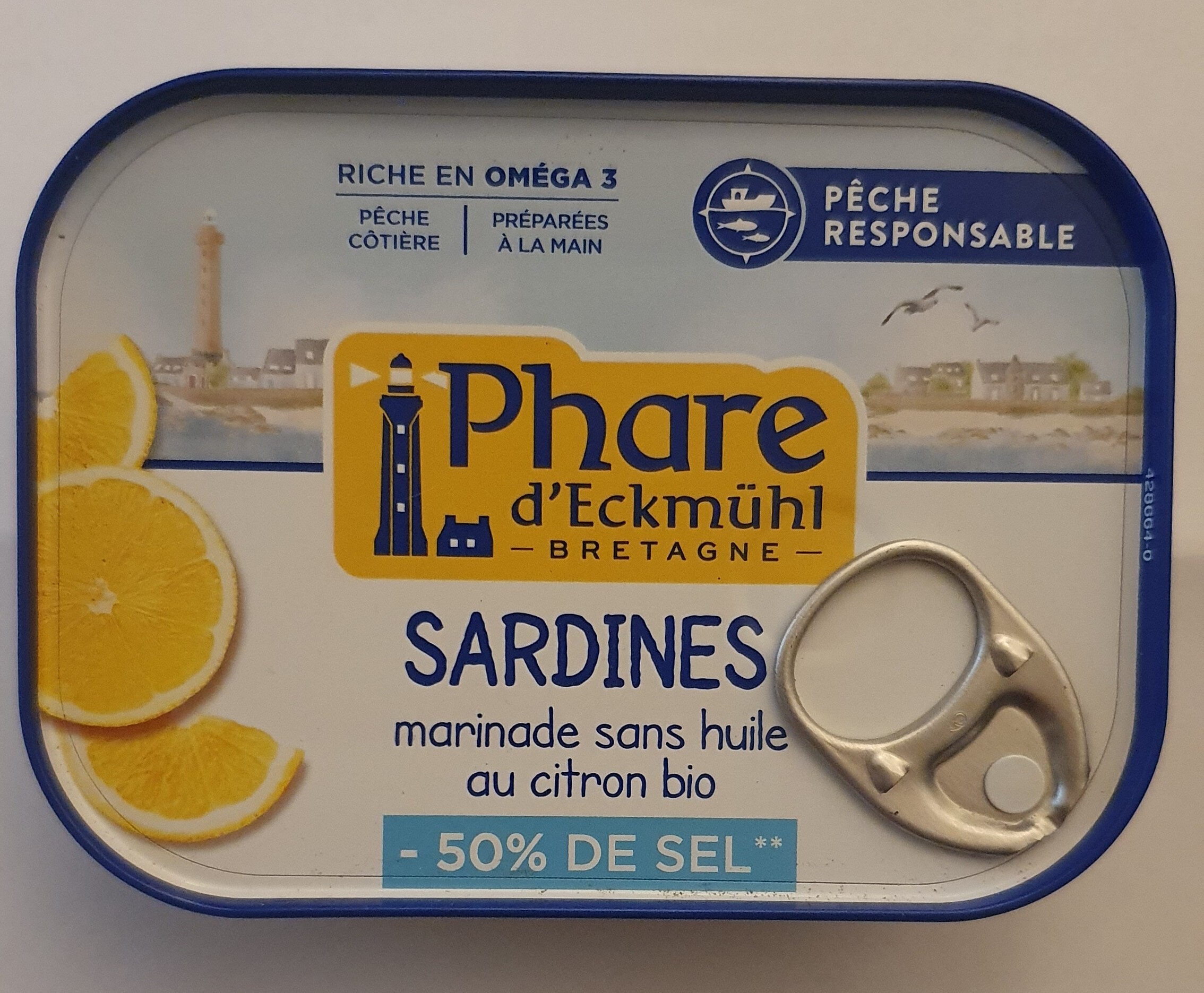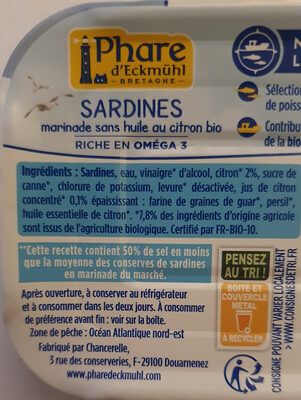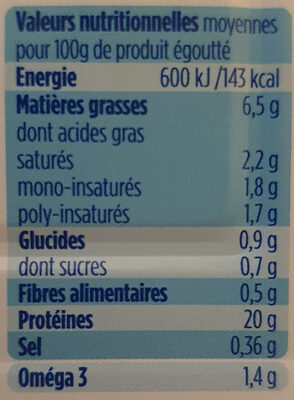Help us make food transparency the norm!
As a non-profit organization, we depend on your donations to continue informing consumers around the world about what they eat.
The food revolution starts with you!
sardines marinade sans huile au citron bio - phare d'eckmühl - 115g
sardines marinade sans huile au citron bio - phare d'eckmühl - 115g
This product page is not complete. You can help to complete it by editing it and adding more data from the photos we have, or by taking more photos using the app for Android or iPhone/iPad. Thank you!
×
Barcode: 18020861
Quantity: 115g
Packaging: Canned, fr:Couvercle en métal
Brands: phare d'eckmühl
Categories: Seafood, Fishes and their products, Canned foods, Fishes, Fatty fishes, Canned fishes, Sardines, Canned sardines, Sardines without oil
Labels, certifications, awards:
Organic, EU Organic, FR-BIO-10, Triman

Origin of ingredients: fr:peche cotiere
Manufacturing or processing places: Douarnenez
Countries where sold: France
Matching with your preferences
Health
Ingredients
-
13 ingredients
: Sardines, eau, vinaigre* d'alcool, citron* 2%, sucre de canne*, chlorure de potassium, levure" désactivée, jus de citron concentré* 0,1% épaississant : farine de graines de guar", persil", huile essentielle de citron". "7,8% des ingrédients d'origine agricole sont issus de l'agriculture biologique. Certifié par FR-BIO-10.Allergens: Fish
Food processing
-
Ultra processed foods
Elements that indicate the product is in the 4 - Ultra processed food and drink products group:
- Additive: E412 - Guar gum
Food products are classified into 4 groups according to their degree of processing:
- Unprocessed or minimally processed foods
- Processed culinary ingredients
- Processed foods
- Ultra processed foods
The determination of the group is based on the category of the product and on the ingredients it contains.
Additives
-
E412 - Guar gum
Guar gum (E412) is a natural food additive derived from guar beans.
This white, odorless powder is valued for its remarkable thickening and stabilizing properties, making it a common ingredient in various food products, including sauces, dressings, and ice creams.
When used in moderation, guar gum is considered safe for consumption, with no known adverse health effects.
Ingredients analysis
-
Palm oil free
No ingredients containing palm oil detected
Unrecognized ingredients: fr:jus-de-citron-concentre-0-1-epaississant, fr:7-8-des-ingredients, fr:fr-10Some ingredients could not be recognized.
We need your help!
You can help us recognize more ingredients and better analyze the list of ingredients for this product and others:
- Edit this product page to correct spelling mistakes in the ingredients list, and/or to remove ingredients in other languages and sentences that are not related to the ingredients.
- Add new entries, synonyms or translations to our multilingual lists of ingredients, ingredient processing methods, and labels.
If you would like to help, join the #ingredients channel on our Slack discussion space and/or learn about ingredients analysis on our wiki. Thank you!
-
Non-vegan
Non-vegan ingredients: SardineSome ingredients could not be recognized.
We need your help!
You can help us recognize more ingredients and better analyze the list of ingredients for this product and others:
- Edit this product page to correct spelling mistakes in the ingredients list, and/or to remove ingredients in other languages and sentences that are not related to the ingredients.
- Add new entries, synonyms or translations to our multilingual lists of ingredients, ingredient processing methods, and labels.
If you would like to help, join the #ingredients channel on our Slack discussion space and/or learn about ingredients analysis on our wiki. Thank you!
-
Non-vegetarian
Non-vegetarian ingredients: SardineSome ingredients could not be recognized.
We need your help!
You can help us recognize more ingredients and better analyze the list of ingredients for this product and others:
- Edit this product page to correct spelling mistakes in the ingredients list, and/or to remove ingredients in other languages and sentences that are not related to the ingredients.
- Add new entries, synonyms or translations to our multilingual lists of ingredients, ingredient processing methods, and labels.
If you would like to help, join the #ingredients channel on our Slack discussion space and/or learn about ingredients analysis on our wiki. Thank you!
-
Details of the analysis of the ingredients
We need your help!
Some ingredients could not be recognized.
We need your help!
You can help us recognize more ingredients and better analyze the list of ingredients for this product and others:
- Edit this product page to correct spelling mistakes in the ingredients list, and/or to remove ingredients in other languages and sentences that are not related to the ingredients.
- Add new entries, synonyms or translations to our multilingual lists of ingredients, ingredient processing methods, and labels.
If you would like to help, join the #ingredients channel on our Slack discussion space and/or learn about ingredients analysis on our wiki. Thank you!
: Sardines, eau, vinaigre* d'alcool, citron 2%, sucre de canne, chlorure de potassium, levure" désactivée, jus de citron concentré* 0.1% épaississant (farine de graines de guar"), persil", huile essentielle de citron", "7.8% des ingrédients, FR- -10- Sardines -> en:sardine - vegan: no - vegetarian: no - ciqual_food_code: 26065 - percent_min: 11.7333333333333 - percent_max: 94
- eau -> en:water - vegan: yes - vegetarian: yes - ciqual_food_code: 18066 - percent_min: 2 - percent_max: 48
- vinaigre* d'alcool -> en:alcohol-vinegar - vegan: yes - vegetarian: yes - ciqual_food_code: 11018 - percent_min: 2 - percent_max: 32.6666666666667
- citron -> en:lemon - vegan: yes - vegetarian: yes - ciqual_proxy_food_code: 13009 - percent_min: 2 - percent: 2 - percent_max: 2
- sucre de canne -> en:cane-sugar - vegan: yes - vegetarian: yes - ciqual_proxy_food_code: 31016 - percent_min: 0 - percent_max: 0.7
- chlorure de potassium -> en:e508 - vegan: yes - vegetarian: yes - percent_min: 0 - percent_max: 0.7
- levure" désactivée -> en:deactivated-yeast - vegan: yes - vegetarian: yes - percent_min: 0 - percent_max: 0.7
- jus de citron concentré* 0.1% épaississant -> fr:jus-de-citron-concentre-0-1-epaississant - percent_min: 0 - percent_max: 0.7
- farine de graines de guar" -> en:e412 - vegan: yes - vegetarian: yes - percent_min: 0 - percent_max: 0.7
- persil" -> en:parsley - vegan: yes - vegetarian: yes - ciqual_proxy_food_code: 11014 - percent_min: 0 - percent_max: 0.7
- huile essentielle de citron" -> en:lemon-oil - vegan: yes - vegetarian: yes - from_palm_oil: no - ciqual_proxy_food_code: 13009 - percent_min: 0 - percent_max: 0.7
- "7.8% des ingrédients -> fr:7-8-des-ingredients - percent_min: 0 - percent_max: 0.7
- FR- -10 -> fr:fr-10 - labels: en:organic - percent_min: 0 - percent_max: 0.7
Nutrition
-
Missing data to compute the Nutri-Score
Missing nutrition facts
⚠ ️The nutrition facts of the product must be specified in order to compute the Nutri-Score.Could you add the information needed to compute the Nutri-Score? Add nutrition facts
-
Nutrient levels
-
Fat in moderate quantity (6.5%)
What you need to know- A high consumption of fat, especially saturated fats, can raise cholesterol, which increases the risk of heart diseases.
Recommendation: Limit the consumption of fat and saturated fat- Choose products with lower fat and saturated fat content.
-
Sugars in low quantity (0.7%)
What you need to know- A high consumption of sugar can cause weight gain and tooth decay. It also augments the risk of type 2 diabetes and cardio-vascular diseases.
Recommendation: Limit the consumption of sugar and sugary drinks- Sugary drinks (such as sodas, fruit beverages, and fruit juices and nectars) should be limited as much as possible (no more than 1 glass a day).
- Choose products with lower sugar content and reduce the consumption of products with added sugars.
-
Salt in moderate quantity (0.36%)
What you need to know- A high consumption of salt (or sodium) can cause raised blood pressure, which can increase the risk of heart disease and stroke.
- Many people who have high blood pressure do not know it, as there are often no symptoms.
- Most people consume too much salt (on average 9 to 12 grams per day), around twice the recommended maximum level of intake.
Recommendation: Limit the consumption of salt and salted food- Reduce the quantity of salt used when cooking, and don't salt again at the table.
- Limit the consumption of salty snacks and choose products with lower salt content.
-
-
Nutrition facts
Nutrition facts As sold
for 100 g / 100 mlCompared to: Sardines without oil Fat 6.5 g -27% Saturated fat ? Carbohydrates 0.9 g -11% Sugars 0.7 g +34% Fiber 0.5 g +135% Proteins 20 g +5% Salt 0.36 g -62% Fruits‚ vegetables‚ nuts and rapeseed‚ walnut and olive oils (estimate from ingredients list analysis) 2.7 %
Environment
-
Eco-Score C - Moderate environmental impact
⚠ ️Select a country in order to include the full impact of transportation.The Eco-Score is an experimental score that summarizes the environmental impacts of food products.→ The Eco-Score was initially developped for France and it is being extended to other European countries. The Eco-Score formula is subject to change as it is regularly improved to make it more precise and better suited to each country.Life cycle analysis
-
Average impact of products of the same category: D (Score: 35/100)
Category: European pilchard or sardine, fillets without fishbone, in olive oil, canned, drained
Category: European pilchard or sardine, fillets without fishbone, in olive oil, canned, drained
- PEF environmental score: 0.88 (the lower the score, the lower the impact)
- including impact on climate change: 6.09 kg CO2 eq/kg of product
Stage Impact Agriculture
52.9 %Processing
6.1 %Packaging
37.8 %Transportation
2.3 %Distribution
0.7 %Consumption
0.2 %
Bonuses and maluses
-
Labels with high environmental benefits
Bonus: +15
-
EU Organic
Organic agriculture contributes to preserve biodiversity, climate, water quality and soil fertility.
Organic food is food produced by methods complying with the standards of organic farming and features practices that cycle resources, promote ecological balance, and conserve biodiversity.
-
-
Missing origins of ingredients information
Malus: -5
⚠ ️ The origins of the ingredients of this product are not indicated.
If they are indicated on the packaging, you can modify the product sheet and add them.
If you are the manufacturer of this product, you can send us the information with our free platform for producers.
-
Packaging with a low impact
Malus: -2
Shape Material Recycling Impact Lid Metal High ⚠ ️ The information about the packaging of this product is not sufficiently precise (exact shapes and materials of all components of the packaging).⚠ ️ For a more precise calculation of the Eco-Score, you can modify the product page and add them.
If you are the manufacturer of this product, you can send us the information with our free platform for producers.
Eco-Score for this product
-
Impact for this product: C (Score: 43/100)
Product: sardines marinade sans huile au citron bio - phare d'eckmühl - 115g
Life cycle analysis score: 35
Sum of bonuses and maluses: +8
Final score: 43/100
-
Carbon footprint
-
Equal to driving 3.2 km in a petrol car
609 g CO² per 100g of product
The carbon emission figure comes from ADEME's Agribalyse database, for the category: European pilchard or sardine, fillets without fishbone, in olive oil, canned, drained (Source: ADEME Agribalyse Database)
Stage Impact Agriculture
18.2 %Processing
8.4 %Packaging
67.9 %Transportation
4.2 %Distribution
0.4 %Consumption
0.9 %
Packaging
-
Packaging with a low impact
-
Packaging parts
Lid (Metal)
-
Packaging materials
Material % Packaging weight Packaging weight per 100 g of product Metal
-
Transportation
-
Origins of ingredients
Missing origins of ingredients information
⚠ ️ The origins of the ingredients of this product are not indicated.
If they are indicated on the packaging, you can modify the product sheet and add them.
If you are the manufacturer of this product, you can send us the information with our free platform for producers.Add the origins of ingredients for this product Add the origins of ingredients for this product
Labels
-
EU Organic
Organic agriculture contributes to preserve biodiversity, climate, water quality and soil fertility.
Organic food is food produced by methods complying with the standards of organic farming and features practices that cycle resources, promote ecological balance, and conserve biodiversity.
Report a problem
-
Incomplete or incorrect information?
Category, labels, ingredients, allergens, nutritional information, photos etc.
If the information does not match the information on the packaging, please complete or correct it. Open Food Facts is a collaborative database, and every contribution is useful for all.
Data sources
Product added on by openfoodfacts-contributors
Last edit of product page on by teolemon.
Product page also edited by off.df32c82c-9595-47d8-8b4a-8c3bdb12dec6, packbot, roboto-app.











